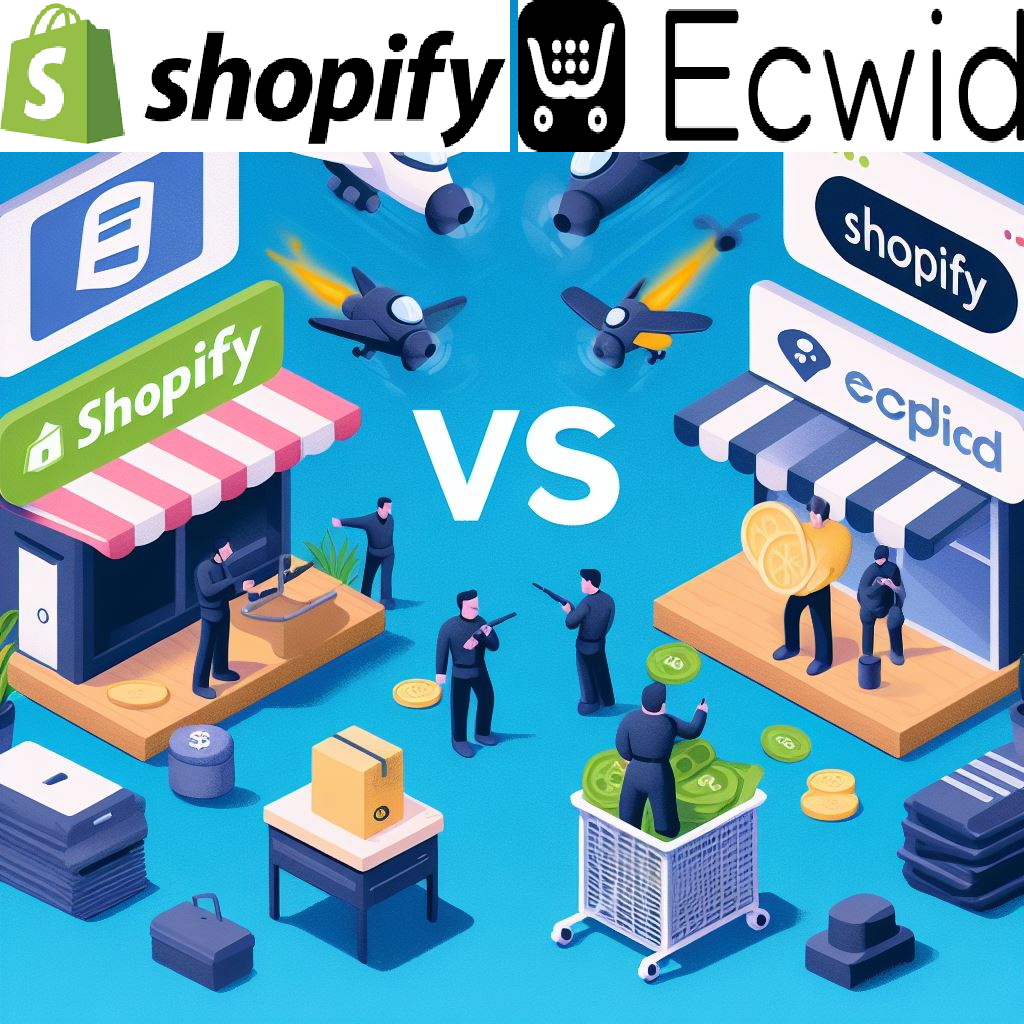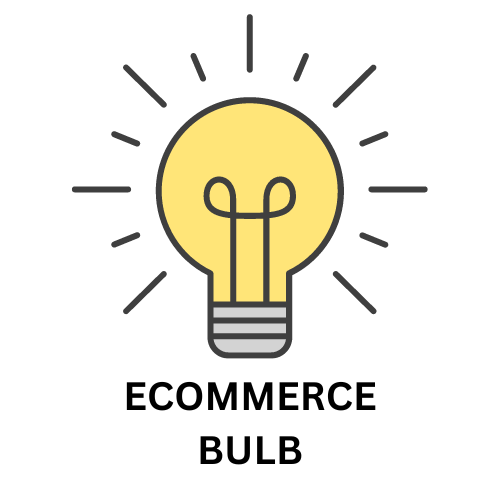
Ecwid Vs Shopify? Which is Better eCommerce Platform?
In order to decide which ecommerce platform to use, Shopify vs Ecwid. A detailed comparison between features must be thoroughly done. If you want to decide which eCommerce platform to choose, there are many things to consider.
These are some examples of these factors:
- Cost.
- SEO friendliness.
- Page load speed.
- Canonical website URL.
- Indexing Control.
- Customizable HTML capabilities.
- Sitemap Generator.
- Integration with Google Analytics.
- Product Tagging and Categorization.
- Batch Uploading.
- Mobile Optimization.
- Built-in Blogging and Marketing Features.
- Social Sharing Buttons.
- Content Management Capabilities.
- Discount and promotion code tools.
- Easy to use Checkout.
- Reporting tools and custom reports.
- Integration of email marketing tools.
- Multiple payment options.
- Flexibility to add new eCommerce features.
- Exclusive features.
- Cons and pros.
Here we’ll discuss these factors to help you decide which platform is better for you, Ecwid or Shopify. And at the end of the discussion, we’ll recap and make a comparison for the scores of all these points to find out which eCommerce platform has the higher score, so that you’ll have a good view about both of them.
Pricing (Shopify Vs Ecwid):

Both Shopify and Ecwid offer a variety of pricing plans to accommodate businesses of different sizes and needs. However, Shopify generally has a more comprehensive range of plans and features, making it a more suitable choice for businesses that require more advanced eCommerce functionality. Ecwid, on the other hand, offers a more affordable option for businesses that need a basic eCommerce solution.
Read More:
Shopify Pricing
Shopify offers five main pricing plans:
| Plan | Price per Month | Features |
|---|---|---|
| Lite | $29 | Unlimited products, basic sales reporting, basic marketing tools |
| Basic | $79 | Unlimited products, sales reporting, marketing tools, shipping discounts |
| Shopify | $299 | Unlimited products, sales reporting, marketing tools, shipping discounts, advanced reporting, gift cards, abandoned cart recovery |
| Advanced | $2999 | Unlimited products, sales reporting, marketing tools, shipping discounts, advanced reporting, gift cards, abandoned cart recovery, customer segments, third-party calculated shipping rates |
| Plus | $999 | Unlimited products, sales reporting, marketing tools, shipping discounts, advanced reporting, gift cards, abandoned cart recovery, customer segments, third-party calculated shipping rates, unlimited staff accounts |

Ecwid Pricing
Ecwid offers four main pricing plans:
| Plan | Price per Month | Features |
|---|---|---|
| Free | $0 | Up to 10 products, basic sales tracking, payment gateway integration |
| Venture | $15 | Up to 100 products, sales tracking, payment gateway integration, marketing tools |
| Business | $39 | Up to 2,500 products, sales tracking, payment gateway integration, marketing tools, multi-channel selling |
| Unlimited | $99 | Unlimited products, sales tracking, payment gateway integration, marketing tools, multi-channel selling, advanced reporting, abandoned cart recovery |
Comparison Summary
| Feature | Shopify | Ecwid |
|---|---|---|
| Number of pricing plans | 5 | 4 |
| Price range | $29 – $999 | $0 – $99 |
| Features per plan | More comprehensive features at higher plans | Basic features at lower plans, advanced features at higher plans |
| Suitability | Businesses of all sizes | Businesses that need a basic eCommerce solution |
| Overall pricing approach | More expensive but offers a wider range of plans and features | More affordable for basic plans but may require additional fees for advanced features |
Conclusion
The choice between Shopify and Ecwid for pricing depends on your specific needs, budget, and growth expectations.
If you prioritize a comprehensive range of features, advanced eCommerce functionality, and the ability to scale your store as you grow, Shopify’s pricing plans can provide a solid foundation for your business.
However, if you are starting out or have a small business with basic eCommerce needs, Ecwid’s pricing plans can be a more affordable option. Just keep in mind that you may need to pay additional fees for advanced features as your business grows.
Read More: (Optimizely Vs. Shopify) The Ultimate Comparison to Take an Enlightened Decision
SEO Capabilities (Shopify Vs Ecwid):

Both Shopify and Ecwid provide SEO-friendly features and capabilities to help you optimize your eCommerce store for search engines and improve your visibility in search results. However, Shopify generally offers a more comprehensive and user-friendly approach to SEO, making it a better choice for businesses that prioritize search engine optimization.
Shopify SEO Features
Shopify offers a range of built-in SEO features, including:
- Search engine optimized URLs: Shopify automatically generates SEO-friendly URLs for your products, categories, and pages, making them easier for search engines to understand and index.
- Meta titles and descriptions: Shopify allows you to easily add meta titles and descriptions to your products, categories, and pages, which provides search engines with concise information about your content.
- Image optimization: Shopify provides tools to optimize your product and page images for search engines, ensuring they load quickly and have appropriate alt text.
- Structured data markup: Shopify automatically adds structured data markup to your pages, which helps search engines understand the context and type of content on your store.
- SEO blog platform: Shopify includes a built-in blog platform that allows you to create and publish SEO-optimized blog posts to attract organic traffic and establish your store as an authority in your industry.
Ecwid SEO Features
Ecwid also provides a range of SEO features, including:
- Search engine optimized URLs: Ecwid automatically generates SEO-friendly URLs for your products, categories, and pages.
- Meta titles and descriptions: Ecwid allows you to easily add meta titles and descriptions to your products, categories, and pages.
- Image optimization: Ecwid provides tools to optimize your product and page images for search engines.
- Structured data markup: Ecwid automatically adds structured data markup to your pages.
- SEO integration with third-party tools: Ecwid integrates with various third-party SEO tools, such as Yoast SEO and Ahrefs, for more advanced optimization.
Comparison Summary
| Feature | Shopify | Ecwid |
|---|---|---|
| Built-in SEO tools | Comprehensive range of built-in SEO features | Limited built-in SEO features but supports integrations with third-party SEO tools |
| User-friendliness for SEO | Easy to implement and manage SEO settings | May require more technical expertise to configure and manage SEO through integrations |
| SEO blog platform | Built-in blog platform for creating SEO-optimized blog posts | Requires integration with a third-party blogging platform |
| Overall SEO approach | More comprehensive and user-friendly built-in SEO features | Flexibility in choosing SEO tools but may require integrations and technical expertise |
Conclusion
If you prioritize a comprehensive and user-friendly approach to SEO, Shopify is generally the better choice. Its built-in SEO features, blog platform, and easy-to-use interface make it easier to optimize your store and improve your visibility in search results.
However, if you have specific SEO requirements or want to use a specific third-party SEO tool, Ecwid’s flexibility in integrations can be valuable. It offers the ability to integrate with the SEO tools that best suit your needs and preferences.
PageLoad Speed (Shopify Vs Ecwid):

Both Shopify and Ecwid offer cloud-based hosting and optimize their platforms for fast page loading speeds. However, Shopify generally has a slight edge in page load speed due to its advanced caching mechanisms and global content delivery network (CDN).
Shopify Page Load Speed Factors
Shopify’s page load speed is influenced by several factors, including:
- Liquid templating engine: Shopify’s Liquid templating engine efficiently renders pages and minimizes server-side processing, contributing to faster page load times.
- Caching mechanisms: Shopify employs various caching techniques to store and deliver static content, such as images and product information, reducing the need to generate content dynamically on each page load.
- Global content delivery network (CDN): Shopify’s CDN distributes content across multiple servers worldwide, ensuring that users are served content from the nearest server for faster delivery.
- Theme optimization: Shopify themes are optimized for performance, using lightweight code and efficient asset loading techniques.
Ecwid Page Load Speed Factors
Ecwid also focuses on page load speed optimization, utilizing various techniques, including:
- JavaScript optimization: Ecwid optimizes its JavaScript code to minimize its impact on page load times.
- Image compression: Ecwid automatically compresses images to reduce their file sizes and improve loading speed.
- Resource optimization: Ecwid prioritizes loading critical resources first, ensuring that the essential elements of a page are loaded quickly.
- Theme design: Ecwid themes are designed to be lightweight and load efficiently, contributing to faster page load times.
Comparison Summary
| Feature | Shopify | Ecwid |
|---|---|---|
| Page load speed optimization | Advanced caching mechanisms, global CDN, theme optimization | JavaScript optimization, image compression, resource optimization, theme design |
| Overall page load speed | Generally has a slight edge in page load speed | Provides good page load speed performance |
| Factors affecting page load speed | Theme quality, app integrations, third-party scripts | Theme quality, app integrations, third-party scripts |
Conclusion
Both Shopify and Ecwid offer fast page loading speeds, ensuring that your eCommerce store provides a smooth and responsive user experience. Shopify’s advanced caching mechanisms and global CDN give it a slight edge in overall page load speed, but Ecwid also provides good performance through its optimization techniques.
Canonical Website URL (Ecwid Vs Shopify):

Both Ecwid and Shopify handle canonical website URLs effectively, ensuring that search engines recognize the primary version of a web page and avoid duplicate content issues.
Ecwid Canonical URLs
Ecwid automatically generates canonical URLs for your store’s pages, including product pages, category pages, and blog posts. These canonical URLs indicate to search engines which version of the page is the primary one, preventing them from indexing multiple versions of the same content.
Additionally, Ecwid allows you to manually set canonical URLs for specific pages if you need more granular control over canonicalization. This is particularly useful for pages that may have multiple URLs or when you want to ensure that search engines index the specific version you prefer.
Shopify Canonical URLs
Shopify also automatically generates canonical URLs for your store’s pages, using similar principles to Ecwid. It utilizes the link tag in the HTML header to specify the canonical URL for each page, informing search engines which version is the authoritative one.
Shopify also provides options to manage canonical URLs manually, allowing you to override default settings and specify custom canonical URLs for specific pages. This can be helpful for pages that may have multiple URLs or when you want to ensure consistent canonicalization across different platforms.
Comparison Summary
| Feature | Ecwid | Shopify |
|---|---|---|
| Automatic canonical URL generation | Yes | Yes |
| Manual canonical URL management | Yes | Yes |
| Handling of multiple URLs | Effective for pages with multiple URLs | Effective for pages with multiple URLs |
| Overall canonical URL handling | Provides effective canonical URL management | Provides effective canonical URL management |
Conclusion
Both Ecwid and Shopify handle canonical website URLs effectively, preventing duplicate content issues and ensuring that search engines recognize the primary version of your store’s pages. The choice between the two platforms for canonical URL handling depends on your specific preferences and requirements.
Indexing Control (Ecwid Vs Shopify):

Both Ecwid and Shopify offer features to control indexing of your eCommerce store’s pages by search engines. However, Shopify generally provides more comprehensive and user-friendly indexing control options, making it a better choice for businesses that prioritize search engine visibility and want granular control over how their content is indexed.
Ecwid Indexing Control
Ecwid provides basic indexing control features, including:
- Robots.txt file: Ecwid automatically generates a robots.txt file that instructs search engines which pages to index and which to avoid.
- Meta robots tags: Ecwid allows you to add meta robots tags to specific pages, providing additional instructions to search engines regarding indexing.
- Noindex option for blog posts: Ecwid offers a noindex option for blog posts, preventing search engines from indexing individual blog posts if you prefer.
Shopify Indexing Control
Shopify provides more advanced indexing control features, including:
- Robots.txt file editor: Shopify provides a user-friendly interface for editing the robots.txt file, allowing you to customize indexing rules for specific pages or sections of your store.
- Meta robots tags: Shopify allows you to add meta robots tags to specific pages, enabling granular control over indexing instructions for individual pages.
- Noindex option for products, categories, and pages: Shopify offers a noindex option for products, categories, and pages, providing flexibility in preventing specific elements from being indexed.
- Password protection for pages: Shopify allows you to password-protect specific pages, preventing search engines from indexing them until the password is entered.
Comparison Summary
| Feature | Ecwid | Shopify |
|---|---|---|
| Robots.txt file management | Basic robots.txt file management | User-friendly robots.txt file editor |
| Meta robots tags | Limited meta robots tag options | Flexible meta robots tag options |
| Noindex options | Limited noindex options | Granular noindex options for various elements |
| Password protection | Limited password protection capabilities | Comprehensive password protection options |
| Overall indexing control | Basic indexing control features | Comprehensive and user-friendly indexing control |
Conclusion
If you prioritize granular control over how your eCommerce store’s content is indexed, Shopify is generally the better choice. Its comprehensive indexing control features, including advanced robots.txt file editing, flexible meta robots tags, and granular noindex options, provide greater flexibility in managing how your store appears in search results.
However, if you have basic indexing needs and are comfortable with manual robots.txt file editing, Ecwid’s indexing control features can still be effective. It provides the essential tools to instruct search engines on which pages to index and which to avoid.
Read More: Is Shopify PaaS or SaaS?
Customizable HTML Capabilities (Shopify Vs Ecwid):

Shopify and Ecwid both offer customizable HTML capabilities for creating a unique and personalized eCommerce store. However, Shopify generally provides more comprehensive and user-friendly customization options, making it a better choice for businesses that prioritize extensive design flexibility and control over their storefront’s appearance.
Shopify HTML Customization
Shopify offers a range of HTML customization features, including:
- Theme editing: Shopify’s built-in theme editor allows you to directly edit the HTML and CSS code of your store’s theme, providing granular control over the design and layout.
- Theme development: Shopify supports custom theme development, enabling you to create a completely bespoke theme from scratch or modify an existing theme to suit your specific needs.
- Third-party theme apps: Shopify’s app ecosystem offers a vast selection of third-party theme apps that provide pre-built HTML templates and design elements, simplifying the customization process.
- Liquid templating engine: Shopify’s Liquid templating engine allows you to dynamically insert content and data into your HTML templates, enhancing the flexibility of your storefront design.
Ecwid HTML Customization
Ecwid also provides HTML customization capabilities, including:
- Direct HTML editing: Ecwid allows you to directly edit the HTML code of your store’s pages, providing control over the design of specific elements.
- Theme development: Ecwid supports custom theme development, enabling you to create a custom theme from scratch or modify an existing theme to suit your specific needs.
- HTML snippets: Ecwid allows you to insert HTML snippets into your store’s pages, providing a way to add custom code and functionality.
- CSS customization: Ecwid allows you to customize the CSS code of your store’s theme, controlling the overall look and feel of your storefront.
Comparison Summary
| Feature | Shopify | Ecwid |
|---|---|---|
| Theme editing | User-friendly theme editor with direct HTML and CSS editing | Limited theme editor with direct HTML editing |
| Theme development | Comprehensive theme development support | Custom theme development support |
| Third-party theme apps | Vast selection of third-party theme apps | Limited third-party theme app options |
| Liquid templating engine | Powerful Liquid templating engine for dynamic content | No built-in templating engine |
| Overall HTML customization | More comprehensive and user-friendly HTML customization options | Limited but still functional HTML customization capabilities |
Conclusion
If extensive HTML customization and design flexibility are crucial for your eCommerce store, Shopify is generally the better choice. Its user-friendly theme editor, comprehensive theme development support, and vast selection of third-party theme apps provide a range of tools to create a highly personalized storefront.
However, if you have basic HTML customization needs and are comfortable with direct HTML editing, Ecwid’s HTML customization capabilities can still be effective. It allows you to make basic design changes and add custom code to your store’s pages.
Sitemap Generators (Shopify Vs Ecwid):

Both Shopify and Ecwid offer sitemap generation capabilities to help search engines discover and index your eCommerce store’s pages. However, Shopify generally provides more advanced and user-friendly sitemap generation features, making it a better choice for businesses that prioritize comprehensive sitemap management and easy control over their sitemap’s content.
Shopify Sitemap Generation
Shopify offers a range of sitemap generation features, including:
- Automatic sitemap creation: Shopify automatically generates a sitemap for your store, ensuring that search engines are aware of all your pages.
- Sitemap customization: Shopify allows you to customize your sitemap by adding or removing specific pages, controlling their priority levels, and specifying change frequencies.
- Sitemap submission to search engines: Shopify provides tools to submit your sitemap to search engines directly, ensuring that your site is properly indexed.
- XML sitemap generation: Shopify generates XML sitemaps, the standard format for communicating site structure to search engines.
- Sitemap updates as content changes: Shopify automatically updates your sitemap when you add or modify pages, ensuring that search engines are always aware of your latest content.
Ecwid Sitemap Generation
Ecwid also provides sitemap generation features, including:
- Automatic sitemap creation: Ecwid automatically generates a sitemap for your store, ensuring that basic pages are indexed by search engines.
- Sitemap customization: Ecwid offers limited sitemap customization options, allowing you to add or remove specific pages but with less granular control over priority levels and change frequencies.
- Sitemap submission to search engines: Ecwid provides a basic tool to submit your sitemap to search engines, but it may require manual submission for thorough indexing.
- XML sitemap generation: Ecwid generates XML sitemaps, the standard format for communicating site structure to search engines.
- Sitemap updates as content changes: Ecwid automatically updates your sitemap when you add or modify pages, but it may not always capture all changes promptly.
Comparison Summary
| Feature | Shopify | Ecwid |
|---|---|---|
| Automatic sitemap creation | Yes | Yes |
| Sitemap customization | Advanced customization options | Limited customization options |
| Sitemap submission to search engines | User-friendly submission tools | May require manual submission for thorough indexing |
| Sitemap format | XML sitemap | XML sitemap |
| Sitemap updates as content changes | Automatic updates with comprehensive change detection | Automatic updates but may not always capture all changes promptly |
Conclusion
If you prioritize comprehensive sitemap management, easy control over your sitemap’s content, and ensuring that all your store’s pages are properly indexed by search engines, Shopify is generally the better choice. Its advanced sitemap customization features, user-friendly submission tools, and automatic updates with comprehensive change detection provide a robust and reliable sitemap management solution.
However, if you have basic sitemap needs and are comfortable with limited customization options, Ecwid’s sitemap generation capabilities can still be effective. It ensures that your basic pages are indexed by search engines and provides a way to submit your sitemap manually for thorough indexing.
Integration With Google Analytics (Shopify Vs Ecwid):

Both Shopify and Ecwid offer seamless integration with Google Analytics, allowing you to track your eCommerce store’s performance and gain valuable insights into customer behavior. However, Shopify generally provides a more comprehensive and user-friendly integration with Google Analytics, making it a better choice for businesses that prioritize in-depth data analysis and advanced tracking capabilities.
Shopify Google Analytics Integration
Shopify’s integration with Google Analytics offers a range of benefits, including:
- Automatic data tracking: Shopify automatically tracks essential eCommerce data, such as page views, product views, add-to-cart events, purchases, and revenue, providing a comprehensive overview of your store’s performance.
- Enhanced eCommerce tracking: Shopify supports enhanced eCommerce tracking, which provides detailed information about product purchases, including product IDs, prices, and quantities, enabling you to analyze product performance and customer preferences.
- Customizable tracking: Shopify allows you to customize your Google Analytics tracking by adding custom dimensions and metrics, capturing specific data points that are relevant to your business and marketing goals.
- Data visualization tools: Shopify provides data visualization tools within its dashboard, offering a quick and easy way to visualize your Google Analytics data and identify trends.
- Integration with third-party analytics tools: Shopify supports integration with third-party analytics tools, such as Google Data Studio and Power BI, allowing you to create custom reports and dashboards for more advanced data analysis.
Ecwid Google Analytics Integration
Ecwid’s integration with Google Analytics also offers essential tracking capabilities, including:
- Basic eCommerce tracking: Ecwid tracks basic eCommerce data, such as page views, product views, add-to-cart events, and purchases, providing a general understanding of your store’s performance.
- Enhanced eCommerce tracking support: Ecwid supports enhanced eCommerce tracking through third-party plugins or custom code implementation, allowing you to capture detailed product purchase information.
- Limited customization: Ecwid provides limited options for customizing your Google Analytics tracking, making it less flexible for capturing specific data points beyond basic eCommerce metrics.
- Third-party data visualization tools: Ecwid relies on third-party data visualization tools for in-depth data analysis, as it doesn’t offer built-in visualization capabilities.
Comparison Summary
| Feature | Shopify | Ecwid |
|---|---|---|
| Automatic data tracking | Comprehensive automatic tracking of essential eCommerce data | Basic automatic tracking of essential eCommerce data |
| Enhanced eCommerce tracking | Built-in enhanced eCommerce tracking | Enhanced eCommerce tracking through third-party plugins or custom code |
| Custom tracking capabilities | Flexible customization options for adding custom dimensions and metrics | Limited customization options for capturing specific data points |
| Data visualization tools | Built-in data visualization tools for quick insights | Requires integration with third-party data visualization tools |
| Integration with third-party analytics tools | Supports integration with third-party analytics tools for advanced analysis | Supports integration with third-party analytics tools for advanced analysis |
Conclusion
If you prioritize in-depth data analysis, advanced tracking capabilities, and a user-friendly integration with Google Analytics, Shopify is generally the better choice. Its comprehensive automatic tracking, built-in enhanced eCommerce tracking, flexible customization options, and built-in data visualization tools provide a robust and user-friendly solution for tracking and analyzing your eCommerce store’s performance.
However, if you have basic data analysis needs and are comfortable with limited customization options, Ecwid’s Google Analytics integration can still be effective. It provides essential data tracking capabilities and supports integration with third-party tools for more advanced analysis.
Ultimately, the best eCommerce platform for Google Analytics integration depends on your specific requirements, technical expertise, and data analysis goals. Carefully evaluate your needs and choose the platform that provides the right level of data tracking, customization flexibility, and ease of use for your eCommerce store’s analytics needs.
Product Tagging and Categorization (Ecwid Vs Shopify):

Both Shopify and Ecwid offer comprehensive product tagging and categorization features to help you organize and manage your eCommerce store’s inventory. However, Shopify generally provides a more user-friendly and advanced approach to product tagging and categorization, making it a better choice for businesses that prioritize efficient product management and enhanced customer search capabilities.
Shopify Product Tagging and Categorization
Shopify’s product tagging and categorization features include:
- Advanced tagging system: Shopify’s tagging system allows you to add multiple tags to each product, enabling you to categorize products based on various attributes, such as brand, color, material, and size.
- Tag hierarchy: Shopify supports a tag hierarchy, allowing you to create parent-child relationships between tags, enabling more granular organization and filtering of products.
- Automatic tag generation: Shopify can automatically generate tags based on product information, such as product title, description, and attributes, saving time and reducing manual effort.
- Tag-based collections: Shopify allows you to create product collections based on specific tags or combinations of tags, providing a flexible way to group and showcase products.
- Tag-based product filtering: Shopify supports tag-based product filtering on the storefront, enabling customers to easily find products based on their preferences.
Ecwid Product Tagging and Categorization
Ecwid’s product tagging and categorization features include:
- Basic tagging system: Ecwid allows you to add tags to each product, enabling you to categorize products based on key attributes.
- Tag hierarchy support: Ecwid supports a basic tag hierarchy, allowing you to create parent-child relationships between tags to some extent.
- Manual tag addition: Ecwid requires manual tag addition for each product, without automatic generation based on product information.
- Tag-based categories: Ecwid allows you to create product categories based on tags, but with limited options for customizing category hierarchies.
- Tag-based product filtering: Ecwid supports tag-based product filtering on the storefront, but the filtering capabilities are less advanced compared to Shopify.
Comparison Summary
| Feature | Shopify | Ecwid |
|---|---|---|
| Tagging system | Advanced tagging system with multiple tags per product | Basic tagging system with limited tags per product |
| Tag hierarchy | Supports a comprehensive tag hierarchy with parent-child relationships | Supports a basic tag hierarchy with limited parent-child relationships |
| Automatic tag generation | Automatically generates tags based on product information | Requires manual tag addition for each product |
| Tag-based collections | Supports flexible tag-based collections with advanced customization | Supports tag-based categories with limited customization |
| Tag-based product filtering | Advanced tag-based product filtering for precise customer search | Basic tag-based product filtering with less flexibility |
Conclusion
If you prioritize efficient product management, advanced tag-based organization, and enhanced customer search capabilities, Shopify is generally the better choice. Its advanced tagging system, tag hierarchy, automatic tag generation, flexible tag-based collections, and powerful tag-based product filtering provide a robust and user-friendly solution for organizing, managing, and showcasing your eCommerce store’s products.
However, if you have basic product categorization needs and are comfortable with manual tag addition, Ecwid’s tagging and categorization features can still be effective. It provides a basic tagging system, tag hierarchy support, tag-based categories, and tag-based product filtering for essential product organization and customer search.
Batch Uploading (Ecwid Vs Shopify):

Both Shopify and Ecwid offer batch uploading capabilities to help you efficiently add multiple products to your eCommerce store. However, Shopify generally provides a more comprehensive and user-friendly approach to batch uploading, making it a better choice for businesses that need to import large product catalogs or regularly add new products.
Shopify Batch Uploading
Shopify offers several methods for batch uploading products, including:
- CSV import: Shopify supports CSV files as the primary format for batch uploading product data. The CSV file can contain detailed product information, such as product titles, descriptions, images, pricing, variants, and inventory levels.
- Third-party apps: Shopify’s app ecosystem offers a variety of third-party apps specifically designed for batch uploading products. These apps provide additional features and automation for importing products from various sources, such as spreadsheets, ERP systems, and marketplaces.
- Data migration tools: Shopify provides data migration tools to assist in transferring product data from your previous eCommerce platform or other sources. This can be helpful if you are switching to Shopify from another platform and need to import your existing product catalog.
Ecwid Batch Uploading
Ecwid also offers batch uploading capabilities, including:
- CSV import: Ecwid supports CSV files for batch uploading product data, similar to Shopify. However, the supported fields and formatting may vary.
- Limited third-party app options: Ecwid’s app ecosystem has fewer third-party apps specifically designed for batch uploading products compared to Shopify.
- Manual data migration: Ecwid relies on manual data migration methods for transferring product data from previous platforms or other sources. This may require more effort and technical expertise compared to Shopify’s data migration tools.
Comparison Summary
| Feature | Shopify | Ecwid |
|---|---|---|
| Primary batch upload method | Comprehensive CSV import with detailed field support | Basic CSV import with limited field support |
| Third-party app options | Wide range of third-party apps for advanced batch uploading | Limited third-party app options for batch uploading |
| Data migration tools | Built-in data migration tools for seamless data transfer | Manual data migration methods requiring technical expertise |
| Overall batch uploading capabilities | More comprehensive, user-friendly, and scalable batch uploading features | Basic, less user-friendly, and less scalable batch uploading features |
Conclusion
If you prioritize efficient batch uploading, particularly for large product catalogs or regular product additions, Shopify is generally the better choice. Its comprehensive CSV import capabilities, wide range of third-party apps, and built-in data migration tools provide a robust and scalable solution for importing and managing your eCommerce store’s product data.
However, if you have limited batch uploading needs or are comfortable with manual data migration, Ecwid’s batch uploading capabilities can still be effective. It provides basic CSV import functionality and allows you to manually import product data from various sources.
Mobile Optimization (Shopify Vs Ecwid):

Both Shopify and Ecwid offer mobile-optimized eCommerce platforms that provide a seamless shopping experience for customers on mobile devices. However, Shopify generally has a slight edge in mobile optimization, offering more advanced features and a more responsive design that adapts to various screen sizes.
Shopify Mobile Optimization
Shopify provides a range of mobile optimization features, including:
- Mobile-first design: Shopify’s themes are designed to prioritize mobile responsiveness, ensuring that your store looks and functions optimally on all screen sizes.
- Accelerated Mobile Pages (AMP): Shopify supports AMP, a Google initiative that optimizes web pages for faster loading on mobile devices.
- Mobile checkout optimization: Shopify’s checkout process is optimized for mobile devices, minimizing the number of steps and providing a user-friendly experience.
- Mobile app: Shopify offers a mobile app for store owners to manage their store on the go, including order processing, product management, and customer communication.
Ecwid Mobile Optimization
Ecwid also offers mobile optimization features, including:
- Responsive design: Ecwid’s themes are designed to adapt to various screen sizes, providing a basic level of mobile responsiveness.
- Mobile-friendly checkout: Ecwid’s checkout process is designed to be mobile-friendly, with a simplified layout and easy-to-use controls.
- Mobile app: Ecwid offers a mobile app for store owners to manage their store on the go, similar to Shopify’s app.
Comparison Summary
| Feature | Shopify | Ecwid |
|---|---|---|
| Mobile-first design | Advanced mobile-first design for optimal mobile experience | Responsive design with basic mobile optimization |
| Accelerated Mobile Pages (AMP) | Supports AMP for faster loading times on mobile | Does not support AMP |
| Mobile checkout optimization | Highly optimized mobile checkout process with minimal steps | Mobile-friendly checkout with simplified layout |
| Mobile app | Comprehensive mobile app for store management | Mobile app for store management with similar features |
Conclusion
If you prioritize a truly mobile-first approach and want to ensure a consistently excellent shopping experience for your customers across all devices, Shopify is generally the better choice. Its advanced mobile-first design, AMP support, highly optimized mobile checkout, and comprehensive mobile app provide a robust and user-friendly solution for mobile eCommerce.
However, if you have basic mobile optimization needs and are satisfied with a responsive design and mobile-friendly checkout, Ecwid’s mobile optimization features can still be effective. It provides a basic level of mobile responsiveness, a user-friendly checkout process, and a mobile app for store management.
Built-in Blogging & Marketing Features (Ecwid Vs Shopify):

Both Shopify and Ecwid offer built-in blogging and marketing features to help you promote your eCommerce store and connect with your target audience. However, Shopify generally provides a more comprehensive and user-friendly approach to blogging and marketing, making it a better choice for businesses that prioritize content marketing and integrated promotional strategies.
Shopify Blogging and Marketing Features
Shopify offers a range of built-in blogging and marketing features, including:
- Integrated blog platform: Shopify provides a built-in blog platform that allows you to easily create and publish blog posts, manage comments, and track blog performance.
- Content marketing tools: Shopify offers various content marketing tools, such as blog post scheduling, social media integration, and email marketing integration, to help you distribute and promote your content effectively.
- Marketing automation tools: Shopify provides marketing automation tools to streamline your marketing efforts, such as email marketing automation, abandoned cart recovery, and customer segmentation.
- SEO optimization: Shopify’s themes and platform are optimized for SEO, helping your store rank higher in search results and attract more organic traffic.
Ecwid Blogging and Marketing Features
Ecwid also offers built-in blogging and marketing features, including:
- Basic blog functionality: Ecwid provides basic blog functionality, allowing you to create and publish blog posts, but with limited management and analytics capabilities.
- Content marketing integration: Ecwid integrates with third-party content marketing tools, such as MailChimp and Hootsuite, for email marketing and social media management.
- Limited marketing automation: Ecwid’s marketing automation capabilities are limited compared to Shopify, with fewer options for email automation and customer segmentation.
- SEO optimization support: Ecwid provides basic SEO optimization support, but it may require additional manual effort to ensure optimal search engine rankings.
Comparison Summary
| Feature | Shopify | Ecwid |
|---|---|---|
| Integrated blog platform | User-friendly and feature-rich blog platform | Basic blog functionality with limited management and analytics |
| Content marketing tools | Comprehensive content marketing tools for content distribution and promotion | Integration with third-party content marketing tools |
| Marketing automation tools | Advanced marketing automation tools for streamlined marketing efforts | Limited marketing automation capabilities |
| SEO optimization | Built-in SEO optimization for improved search engine rankings | Basic SEO optimization support with potential need for manual effort |
Conclusion
If you prioritize content marketing, integrated promotional strategies, and a seamless user experience for managing your blog and marketing activities, Shopify is generally the better choice. Its integrated blog platform, comprehensive content marketing tools, advanced marketing automation tools, and built-in SEO optimization provide a robust and user-friendly solution for promoting your eCommerce store and engaging with your target audience.
However, if you have basic blogging and marketing needs and are comfortable with using third-party tools for content marketing and social media management, Ecwid’s blogging and marketing features can still be effective. It provides basic blog functionality, third-party tool integration, limited marketing automation, and basic SEO optimization support.
Social Sharing Buttons Availability (Ecwid Vs Shopify):

Both Shopify and Ecwid offer social sharing buttons to help you promote your products and content across various social media platforms. However, Shopify generally provides a wider selection of pre-built social sharing buttons and more customization options, making it a better choice for businesses that prioritize extensive social media engagement and control over the appearance and functionality of their social sharing buttons.
Shopify Social Sharing Buttons
Shopify offers a range of social sharing buttons, including:
- Pre-built social sharing buttons: Shopify provides a wide selection of pre-built social sharing buttons for popular social media platforms, such as Facebook, Twitter, Instagram, Pinterest, and more.
- Customizable social sharing buttons: Shopify allows you to customize the appearance and functionality of your social sharing buttons, including the size, color, and placement of the buttons.
- Social sharing plugins: Shopify’s app ecosystem offers a variety of third-party social sharing plugins that provide additional features and customization options for social sharing buttons.
Ecwid Social Sharing Buttons
Ecwid also offers social sharing buttons, including:
- Basic social sharing buttons: Ecwid provides a basic set of pre-built social sharing buttons for popular social media platforms.
- Limited customization options: Ecwid offers limited customization options for social sharing buttons, primarily related to the placement and alignment of the buttons.
- Third-party social sharing plugins: Ecwid’s app ecosystem offers a limited selection of third-party social sharing plugins compared to Shopify.
Comparison Summary
| Feature | Shopify | Ecwid |
|---|---|---|
| Pre-built social sharing buttons | Wider selection of pre-built social sharing buttons for various platforms | Basic set of pre-built social sharing buttons for popular platforms |
| Customizable social sharing buttons | Extensive customization options for button appearance and functionality | Limited customization options for button placement and alignment |
| Third-party social sharing plugins | Vast selection of third-party social sharing plugins for advanced features | Limited selection of third-party social sharing plugins |
Conclusion
If you prioritize extensive social media engagement, granular control over the appearance and functionality of your social sharing buttons, and access to a wide range of social sharing plugins, Shopify is generally the better choice. Its extensive selection of pre-built buttons, comprehensive customization options, and vast ecosystem of third-party plugins provide a robust and flexible solution for integrating social sharing into your eCommerce store.
However, if you have basic social sharing needs and are comfortable with limited customization options, Ecwid’s social sharing buttons can still be effective. It provides a basic set of pre-built buttons for popular platforms, allows for basic button placement customization, and offers a limited selection of third-party social sharing plugins.
Content Management Capabilities (Ecwid Vs Shopify):

Both Shopify and Ecwid offer comprehensive content management capabilities to help you create and manage engaging content for your eCommerce store. However, Shopify generally provides a more user-friendly and feature-rich content management system (CMS), making it a better choice for businesses that prioritize sophisticated content creation, easy content editing, and seamless integration with other marketing tools.
Shopify Content Management Capabilities
Shopify’s CMS offers a range of features, including:
- User-friendly interface: Shopify’s CMS provides a user-friendly and intuitive interface that makes it easy to create and manage content, even for users with limited technical experience.
- Rich text editor: Shopify’s rich text editor provides a variety of formatting options and tools for creating visually appealing and engaging content.
- Customizable templates: Shopify offers a wide selection of customizable templates for different types of content, such as product pages, blog posts, and landing pages.
- Content scheduling: Shopify allows you to schedule content to be published at a specific time, ensuring that your content is released at the most opportune moment.
- Content marketing integration: Shopify seamlessly integrates with various content marketing tools, such as MailChimp and Hootsuite, for easy content distribution and promotion.
Ecwid Content Management Capabilities
Ecwid’s CMS also offers essential content management features, including:
- Basic content creation: Ecwid’s CMS allows you to create and manage basic content, such as product descriptions, blog posts, and page content.
- Limited formatting options: Ecwid’s rich text editor provides fewer formatting options compared to Shopify’s editor, limiting the creative possibilities for content presentation.
- Template selection: Ecwid offers a selection of templates for different types of content, but the customization options are more limited compared to Shopify.
- Manual content scheduling: Ecwid requires manual scheduling of content publication, which may be less convenient compared to Shopify’s automated scheduling feature.
- Third-party content marketing integration: Ecwid integrates with third-party content marketing tools, but the integration process may require additional effort compared to Shopify’s seamless integration.
Comparison Summary
| Feature | Shopify | Ecwid |
|---|---|---|
| User-friendliness | Highly user-friendly interface with intuitive content management tools | Basic user interface with limited content management tools |
| Rich text editor | Comprehensive rich text editor with a variety of formatting options | Limited rich text editor with fewer formatting options |
| Customizable templates | Wide selection of customizable templates for different types of content | Limited selection of templates with less customization flexibility |
| Content scheduling | Automated content scheduling for timely publishing | Manual content scheduling requiring manual effort |
| Content marketing integration | Seamless integration with various content marketing tools | Integration with third-party content marketing tools may require additional effort |
Conclusion
If you prioritize sophisticated content creation, easy content editing, seamless integration with other marketing tools, and a user-friendly interface for content management, Shopify is generally the better choice. Its advanced CMS, comprehensive rich text editor, customizable templates, automated content scheduling, and seamless content marketing integration provide a robust and user-friendly solution for creating and managing engaging content for your eCommerce store.
However, if you have basic content management needs and are comfortable with limited formatting options and manual content scheduling, Ecwid’s CMS can still be effective. It provides basic content creation tools, template selection, and integration with third-party content marketing tools for managing essential content elements for your eCommerce store.
Discounts & Promotion Codes (Ecwid Vs Shopify):

Both Shopify and Ecwid offer a variety of discounts and promotion codes to help you attract customers and boost your eCommerce sales. However, Shopify generally provides a more comprehensive and user-friendly approach to discounts and promotion codes, making it a better choice for businesses that want to implement sophisticated promotional strategies and easily manage their discounts.
Shopify Discounts and Promotion Codes
Shopify offers a range of discount and promotion code features, including:
- Flexible discount types: Shopify supports various discount types, such as fixed discounts, percentage discounts, free shipping discounts, and buy one, get one discounts.
- Advanced discount targeting: Shopify allows you to target discounts to specific customer groups, products, or collections, ensuring that your promotions reach the right audience.
- Scheduling and automation: Shopify enables you to schedule discounts to run for specific periods or times, and you can automate discount application based on customer behavior or cart conditions.
- Promotion code management: Shopify provides a user-friendly interface for creating, managing, and tracking promotion codes, including settings for code usage limits, expiry dates, and code generation options.
- Integrations with third-party apps: Shopify’s app ecosystem offers a variety of third-party apps that provide additional features for discounts and promotions, such as advanced targeting, automated code generation, and customer segmentation.
Ecwid Discounts and Promotion Codes
Ecwid also offers essential discount and promotion code features, including:
- Basic discount types: Ecwid supports basic discount types, such as fixed discounts and percentage discounts, but it lacks the advanced discount types available on Shopify.
- Limited targeting options: Ecwid’s discount targeting capabilities are more limited compared to Shopify, allowing you to target discounts to specific customer groups or products but with fewer customization options.
- Manual scheduling: Ecwid requires manual scheduling of discounts, while Shopify offers automated scheduling based on specific dates or times.
- Basic promotion code management: Ecwid provides a basic interface for creating and managing promotion codes, but it may be less user-friendly and lack some of the advanced code management features available on Shopify.
- Limited third-party app integrations: Ecwid’s app ecosystem has fewer third-party apps specifically designed for discounts and promotions compared to Shopify, limiting the availability of advanced features.
Comparison Summary
| Feature | Shopify | Ecwid |
|---|---|---|
| Flexible discount types | Supports various discount types, including fixed, percentage, free shipping, and buy one, get one discounts | Supports basic discount types, including fixed and percentage discounts |
| Advanced discount targeting | Allows granular targeting to specific customer groups, products, or collections | Provides limited targeting options to specific customer groups or products |
| Scheduling and automation | Enables scheduled discounts and automated discount application | Requires manual scheduling of discounts |
| Promotion code management | User-friendly interface for creating, managing, and tracking promotion codes with advanced features | Basic interface for creating and managing promotion codes with limited features |
| Third-party app integrations | Wide range of third-party apps for advanced discount and promotion features | Limited third-party app options for discounts and promotions |
Conclusion
If you prioritize sophisticated promotional strategies, flexible discount types, advanced discount targeting, automated scheduling, comprehensive promotion code management, and a wider range of third-party app integrations, Shopify is generally the better choice. Its advanced discount and promotion code features provide a robust and user-friendly solution for implementing effective promotional campaigns and managing your eCommerce store’s discounts seamlessly.
However, if you have basic discount needs and are comfortable with manual scheduling and limited targeting options, Ecwid’s discount and promotion code features can still be effective. It provides essential discount types, basic targeting capabilities, manual scheduling, and basic promotion code management for handling fundamental promotional strategies.
Easy to Use Checkout (Ecwid Vs Shopify):

Both Shopify and Ecwid offer user-friendly checkout processes designed to minimize friction and maximize conversion rates. However, Shopify generally provides a more streamlined and optimized checkout experience, making it a better choice for businesses that prioritize customer convenience and a seamless checkout flow.
Shopify Checkout
Shopify’s checkout process is known for its simplicity and ease of use, offering a range of features that enhance the customer experience, including:
- Guest checkout option: Shopify allows customers to checkout without creating an account, reducing the number of steps required and minimizing friction for impulse purchases.
- Multi-step checkout: Shopify’s checkout process is divided into clear and concise steps, guiding customers through the checkout process without overwhelming them.
- Progress indicator: Shopify provides a progress indicator that shows customers their progress through the checkout process, keeping them informed and reducing uncertainty.
- Address auto-fill: Shopify automatically fills in customer addresses based on their previous entries or saved information, saving time and improving the checkout experience.
- Payment gateway integration: Shopify integrates with a wide range of payment gateways, ensuring that customers can choose their preferred payment method.
Ecwid Checkout
Ecwid’s checkout process is also user-friendly and straightforward, offering essential features for a smooth checkout experience, including:
- Guest checkout option: Ecwid allows customers to checkout without creating an account, providing a convenient option for impulse purchases.
- Simple checkout layout: Ecwid’s checkout layout is simple and easy to navigate, with clear instructions and minimal clutter.
- Payment gateway integration: Ecwid integrates with a variety of payment gateways, enabling customers to choose their preferred payment method.
Comparison Summary
| Feature | Shopify | Ecwid |
|---|---|---|
| Guest checkout | Seamless and optimized guest checkout experience | Simple and straightforward guest checkout option |
| Multi-step checkout | Clear and concise multi-step checkout process | Basic multi-step checkout layout |
| Progress indicator | Visible progress indicator for customers to track their checkout progress | Optional progress indicator |
| Address auto-fill | Automatic address fill-in based on previous entries or saved information | Limited address auto-fill capabilities |
| Payment gateway integration | Extensive integration with various payment gateways | Integration with a range of payment gateways |
Conclusion
If you prioritize a truly streamlined and optimized checkout experience that minimizes friction and maximizes conversion rates, Shopify is generally the better choice. Its guest checkout option, multi-step checkout, progress indicator, advanced address auto-fill, and extensive payment gateway integration provide a robust and user-friendly solution for creating a seamless checkout flow that encourages customers to complete their purchases.
However, if you have basic checkout needs and are satisfied with a simple checkout layout and essential payment gateway integration, Ecwid’s checkout process can still be effective. It provides a guest checkout option, a basic multi-step checkout, integration with various payment gateways, and optional progress indicator for a straightforward checkout experience.
Reporting Tools and Custom Reports (Ecwid Vs Shopify):

Both Shopify and Ecwid offer comprehensive reporting tools to help you track your eCommerce store’s performance and gain valuable insights into customer behavior, sales trends, and marketing effectiveness. However, Shopify generally provides a more advanced and user-friendly approach to reporting, making it a better choice for businesses that prioritize in-depth data analysis, customizable reporting, and integration with third-party analytics tools.
Shopify Reporting Tools
Shopify’s reporting tools include:
- Comprehensive data collection: Shopify automatically tracks a wide range of eCommerce data, including sales, orders, products, customers, and marketing campaigns, providing a comprehensive overview of your store’s performance.
- User-friendly dashboards: Shopify provides pre-built dashboards that visualize key business metrics, making it easy to identify trends and patterns at a glance.
- Customizable reports: Shopify allows you to create custom reports based on specific data points or metrics, enabling you to tailor your analysis to your unique business needs.
- Data export capabilities: Shopify allows you to export your data in various formats, such as CSV and Excel, for further analysis in third-party tools.
- Third-party analytics integrations: Shopify supports integration with popular third-party analytics tools, such as Google Data Studio and Power BI, providing advanced data visualization and analysis capabilities.
Ecwid Reporting Tools
Ecwid’s reporting tools include:
- Basic data tracking: Ecwid tracks essential eCommerce data, such as sales, orders, products, and customers, providing a general understanding of your store’s performance.
- Limited dashboard options: Ecwid offers pre-built dashboards, but the level of customization and data visualization is less advanced compared to Shopify.
- Restricted report customization: Ecwid’s report customization options are more limited compared to Shopify, with fewer options for filtering and analyzing data.
- Limited data export capabilities: Ecwid’s data export options are more restricted, with fewer file formats and less flexibility for exporting specific data segments.
- Fewer third-party analytics integrations: Ecwid supports integration with a limited number of third-party analytics tools, providing less flexibility for advanced data analysis.
Comparison Summary
| Feature | Shopify | Ecwid |
|---|---|---|
| Data collection | Comprehensive data collection of key eCommerce metrics | Basic data tracking of essential eCommerce metrics |
| User-friendly dashboards | Pre-built dashboards with advanced data visualization capabilities | Pre-built dashboards with limited data visualization |
| Customizable reports | Extensive customization options for creating personalized reports | Limited report customization options |
| Data export capabilities | Flexible data export in various formats | Restricted data export options with fewer file formats |
| Third-party analytics integrations | Supports integration with popular third-party analytics tools | Limited third-party analytics integrations |
Conclusion
If you prioritize in-depth data analysis, advanced report customization, flexible data export options, and access to a wide range of third-party analytics tools for sophisticated data visualization and analysis, Shopify is generally the better choice. Its comprehensive data collection, user-friendly dashboards, customizable reports, extensive data export capabilities, and support for popular third-party analytics tools provide a robust and user-friendly solution for tracking, analyzing, and understanding your eCommerce store’s performance.
However, if you have basic reporting needs and are comfortable with limited report customization and fewer third-party analytics integrations, Ecwid’s reporting tools can still be effective. It provides essential data tracking, pre-built dashboards, basic report customization options, limited data export capabilities, and integration with a few third-party analytics tools for managing your store’s fundamental reporting needs.
Integration of Email Marketing Tools (Ecwid Vs Shopify):

Both Shopify and Ecwid offer seamless integration with email marketing tools, allowing you to effectively manage your email marketing campaigns and engage with your customers directly from your eCommerce store. However, Shopify generally provides a more comprehensive and integrated approach to email marketing, making it a better choice for businesses that prioritize sophisticated email marketing strategies and seamless integration with popular email marketing platforms.
Shopify Email Marketing Integration
Shopify offers a range of email marketing integration features, including:
- Built-in email marketing platform: Shopify provides its own email marketing platform, Shopify Email, which is tightly integrated with your store’s data and allows you to create, send, and track email campaigns directly from your Shopify dashboard.
- Integration with popular email marketing providers: Shopify supports integration with a wide range of third-party email marketing providers, such as MailChimp, ActiveCampaign, and Constant Contact, providing flexibility and compatibility with your preferred email marketing platform.
- Automated email campaigns: Shopify allows you to automate your email marketing campaigns based on various triggers, such as abandoned carts, welcome emails, and product recommendations, ensuring timely and relevant communication with your customers.
- Data synchronization: Shopify automatically synchronizes customer data, product information, and order details with your email marketing platform, ensuring that your campaigns are always up-to-date with the latest customer information.
- Campaign tracking and analytics: Shopify provides comprehensive campaign tracking and analytics, allowing you to measure the performance of your email campaigns, identify areas for improvement, and optimize your email marketing strategies.
Ecwid Email Marketing Integration
Ecwid also offers essential email marketing integration features, including:
- Third-party email marketing integration: Ecwid supports integration with a variety of third-party email marketing providers, such as MailChimp, Sendinblue, and Klaviyo, providing flexibility in choosing your preferred email marketing platform.
- Limited automation capabilities: Ecwid offers limited automation options for email campaigns, requiring manual setup for most automated email triggers.
- Manual data synchronization: Ecwid may require manual data synchronization between your store and your email marketing platform, potentially introducing delays in customer data updates.
- Basic campaign tracking: Ecwid provides basic campaign tracking and analytics, giving you an overview of your email campaign performance but with fewer advanced insights compared to Shopify.
Comparison Summary
| Feature | Shopify | Ecwid |
|---|---|---|
| Built-in email marketing platform | Yes – Shopify Email | No, requires third-party integration |
| Third-party email marketing integration | Wide range of third-party providers | Limited selection of third-party providers |
| Automated email campaigns | Extensive automation options with various triggers | Limited automation capabilities and manual setup |
| Data synchronization | Automatic data synchronization ensures up-to-date information | Manual data synchronization may lead to delays |
| Campaign tracking and analytics | Comprehensive tracking and analytics for in-depth insights | Basic tracking and analytics with fewer advanced insights |
Conclusion
If you prioritize sophisticated email marketing strategies, seamless integration with popular email marketing platforms, automated email campaigns, automatic data synchronization, and comprehensive campaign tracking and analytics, Shopify is generally the better choice. Its built-in email marketing platform, wide range of third-party integrations, extensive automation options, automatic data synchronization, and comprehensive campaign tracking provide a robust and integrated solution for managing your email marketing campaigns effectively.
However, if you have basic email marketing needs and are comfortable with manual campaign setup, limited automation, and basic campaign tracking, Ecwid’s email marketing integration can still be effective. It provides integration with third-party email marketing platforms, manual data synchronization options, and basic campaign tracking for managing essential email marketing activities.
Multiple Payment Options (Ecwid Vs Shopify):

Which eCommerce Platform has More Payment Options (Ecwid Vs Shopify)?
Shopify generally offers a wider range of payment options compared to Ecwid, providing more flexibility for businesses to accept payments from customers worldwide and cater to various payment preferences.
Shopify Payment Options
Shopify supports a vast array of payment options, including:
- Credit and Debit Cards: Shopify integrates with popular credit and debit card processors, such as Visa, Mastercard, American Express, and Discover, enabling global payment acceptance.
- Digital Wallets: Shopify supports digital wallets, such as Apple Pay, Google Pay, and PayPal, providing a convenient and secure payment experience for customers.
- Alternative Payment Methods: Shopify offers various alternative payment methods, such as bank transfers, cash on delivery, and buy now, pay later (BNPL) options, catering to diverse customer preferences and regions.
- Global Payment Gateways: Shopify integrates with numerous global payment gateways, such as Stripe, PayPal, and Adyen, to facilitate international transactions and comply with local payment regulations.
- Shopify Payments: Shopify offers its own payment processing solution, Shopify Payments, which provides competitive rates, seamless integration, and additional features like fraud protection and chargeback management.
Ecwid Payment Options
Ecwid also offers a selection of payment options, including:
- Credit and Debit Cards: Ecwid integrates with major credit and debit card processors, such as Visa, Mastercard, American Express, and Discover, covering essential payment options.
- Digital Wallets: Ecwid supports limited digital wallets, such as PayPal, and may require additional setup for some regions or currencies.
- Alternative Payment Methods: Ecwid offers fewer alternative payment methods compared to Shopify, with availability varying by region.
- Global Payment Gateways: Ecwid integrates with a few global payment gateways, such as Stripe and PayPal, but may have limitations in certain regions or currencies.
- Ecwid Instant Pay: Ecwid offers its own payment processing solution, Ecwid Instant Pay, which is available in selected regions and may have additional fees or limitations.
Comparison Summary
| Feature | Shopify | Ecwid |
|---|---|---|
| Credit and Debit Card Coverage | Wider range of credit and debit card processors | Essential credit and debit card processors |
| Digital Wallet Support | Comprehensive digital wallet integration, including Apple Pay, Google Pay, and PayPal | Limited digital wallet support, primarily PayPal |
| Alternative Payment Method Variety | Extensive selection of alternative payment methods, including BNPL options | Limited alternative payment methods, availability varies by region |
| Global Payment Gateway Integration | Supports numerous global payment gateways for international transactions | Supports a few global payment gateways, may have limitations |
| Proprietary Payment Solution | Shopify Payments with competitive rates, seamless integration, and additional features | Ecwid Instant Pay with regional availability and potential fees |
Conclusion
If you prioritize a wide range of payment options, global reach, and flexibility to accommodate diverse customer preferences, Shopify is generally the better choice. Its extensive credit and debit card coverage, comprehensive digital wallet integration, vast alternative payment methods, global payment gateway support, and proprietary Shopify Payments solution provide a versatile and comprehensive solution for accepting payments from customers worldwide.
However, if you have basic payment needs and are satisfied with essential credit and debit card options, limited digital wallet support, and a selection of alternative payment methods, Ecwid’s payment options can still be effective. It provides core payment processing capabilities for managing payments from customers within your target market.
Flexibility to Add New eCommerce Features (Ecwid Vs Shopify):

Which eCommerce Platform is More Flexible to Add New eCommerce Features (Ecwid Vs Shopify)?
Shopify is generally considered to be more flexible for adding new eCommerce features compared to Ecwid. This is due to several factors, including:
- More extensive app ecosystem: Shopify has a vast app ecosystem with over 6,000 apps, providing a wide range of functionality for adding new features to your store. These apps cover a diverse range of categories, such as marketing, sales, customer service, inventory management, and more.
- Customizable themes: Shopify offers a wide selection of customizable themes that can be tailored to your brand and specific needs. You can also modify the code of your theme to add custom features and functionality.
- Third-party integrations: Shopify integrates with a variety of third-party services, such as payment gateways, shipping carriers, and email marketing platforms, which can further extend the functionality of your store.
- Developer tools: Shopify provides a comprehensive set of developer tools, including documentation, APIs, and SDKs, which make it easier for developers to create custom apps and integrations for your store.
In contrast, Ecwid has a smaller app ecosystem with approximately 200 apps, and its theme customization options are more limited. Additionally, Ecwid’s third-party integrations and developer tools are not as robust as Shopify’s.
Here is a table summarizing the key differences between Shopify and Ecwid in terms of flexibility for adding new eCommerce features:
| Feature | Shopify | Ecwid |
|---|---|---|
| App ecosystem size | Over 6,000 apps | Approximately 200 apps |
| Theme customization | Highly customizable themes with code access | More limited theme customization options |
| Third-party integrations | Integrates with a wide range of third-party services | Limited third-party integrations |
| Developer tools | Comprehensive developer tools with documentation, APIs, and SDKs | Less robust developer tools |
Overall, Shopify is the more flexible platform for adding new eCommerce features due to its vast app ecosystem, customizable themes, extensive third-party integrations, and robust developer tools. This makes it a better choice for businesses that need a highly customizable and scalable eCommerce solution. However, Ecwid can still be a good option for businesses with more basic eCommerce needs and a smaller budget.
Exclusive Features (Ecwid Vs Shopify):

Both Shopify and Ecwid offer a range of exclusive features that can be beneficial for eCommerce businesses. However, Shopify generally has a wider range of exclusive features and a more comprehensive feature set overall. This is due to several factors, including Shopify’s larger development team, longer track record, and focus on innovation.
Here is a table summarizing some of the key exclusive features offered by Shopify and Ecwid:
| Feature | Shopify | Ecwid |
|---|---|---|
| Multi-channel selling: Shopify supports selling across multiple channels, including your own online store, Amazon, Facebook, Instagram, and more. Ecwid supports selling on your own online store and a few other marketplaces, but its multi-channel selling capabilities are more limited. | ||
| Abandoned cart recovery: Shopify has a built-in abandoned cart recovery feature that automatically sends emails to customers who have left items in their carts. Ecwid does not have a built-in abandoned cart recovery feature, but it does integrate with third-party abandoned cart recovery apps. | ||
| Advanced reporting: Shopify offers comprehensive reporting features that allow you to track your store’s performance in detail. Ecwid’s reporting features are more basic, but they still provide essential insights into your store’s performance. | ||
| App store: Shopify has a vast app ecosystem with over 6,000 apps that can extend the functionality of your store. Ecwid’s app ecosystem is smaller, with approximately 200 apps. | ||
| POS system: Shopify offers a free mobile POS system that you can use to sell in person. Ecwid does not have a built-in POS system, but it does integrate with third-party POS systems. |
In addition to these exclusive features, Shopify also offers a wider range of standard eCommerce features, such as product management, inventory management, shipping and fulfillment, and customer management.
Overall, Shopify is the platform with more comprehensive exclusive features and a broader range of standard eCommerce features. This makes it a better choice for businesses that need a powerful and feature-rich eCommerce solution. However, Ecwid can still be a good option for businesses with more basic eCommerce needs and a smaller budget.
Here is a table summarizing the overall feature comparison between Shopify and Ecwid:
| Feature category | Shopify | Ecwid |
|---|---|---|
| Multi-channel selling | More comprehensive | More limited |
| Abandoned cart recovery | Built-in | Requires third-party app |
| Reporting | Advanced | Basic |
| App ecosystem | Vast | Smaller |
| POS system | Built-in mobile POS | Requires third-party POS |
| Standard eCommerce features | Wider range | More limited |
Overall, Shopify is the platform with more comprehensive features, both exclusive and standard. This makes it a better choice for businesses that need a powerful and versatile eCommerce solution. However, Ecwid can still be a good option for businesses with more basic eCommerce needs and a smaller budget.
Market Share (Ecwid Vs Shopify):

What are the Market Share statistics (Ecwid Vs Shopify)?
According to the latest data from SimilarTech, Shopify holds a significantly larger market share compared to Ecwid in the eCommerce platform category. As of October 2023, Shopify accounts for 16.34% of the global market share, while Ecwid holds 0.14% of the market share. This indicates that Shopify is the more widely used and popular eCommerce platform among businesses of all sizes.
Here’s a breakdown of the market share distribution among the top eCommerce platforms:
- WooCommerce: 65.10%
- Shopify: 16.34%
- Oracle Commerce: 5.64%
- Magento: 4.63%
- BigCommerce: 3.11%
- Ecwid: 0.14%
The reasons for Shopify’s dominance in the eCommerce market include its comprehensive feature set, ease of use, scalability, and extensive app ecosystem. Shopify provides a wide range of features to help businesses manage their online stores, including product management, inventory management, marketing tools, customer service tools, and more. It is also easy to use and can be scaled to accommodate businesses of all sizes. Additionally, Shopify has a vast app ecosystem with over 6,000 apps that can extend the functionality of your store.
Ecwid is a smaller and less popular eCommerce platform, but it is still a viable option for businesses with basic needs and a limited budget. Ecwid is easy to use and provides essential eCommerce features, such as product management, inventory management, payment processing, and shipping and fulfilment. However, it does not offer the same level of features or scalability as Shopify.
Cons Of Ecwid Vs. Shopify:

While Ecwid offers a user-friendly and affordable eCommerce platform, it has certain drawbacks compared to Shopify, a more robust and feature-rich platform. Here’s a comparison of the downsides of Ecwid and Shopify:
Ecwid Downsides
- Limited App Ecosystem: Ecwid’s app ecosystem is relatively smaller compared to Shopify, with around 200 apps, while Shopify boasts over 6,000 apps. This limits the customization and functionality options available for Ecwid stores.
- Restricted Theme Customization: Ecwid’s theme customization options are more limited compared to Shopify, making it challenging to achieve a highly personalized and branded storefront experience.
- Basic Reporting Features: Ecwid’s reporting features are more basic, providing less in-depth insights into store performance compared to Shopify’s comprehensive reporting tools.
- Fewer Third-party Integrations: Ecwid has fewer third-party integrations, limiting its ability to connect with various marketing, sales, and customer support tools.
- Limited Multi-channel Selling: Ecwid’s multi-channel selling capabilities are more restricted compared to Shopify, making it less suitable for businesses that want to sell across multiple platforms.
Shopify Downsides
- Higher Pricing: Shopify’s pricing plans are generally more expensive than Ecwid’s, making it a less affordable option for businesses with limited budgets.
- Steeper Learning Curve: Shopify’s comprehensive feature set can create a steeper learning curve compared to Ecwid, requiring more time and effort to master the platform.
- Potential for Overlap with Existing Systems: Shopify’s extensive features may overlap with existing systems businesses already use, leading to potential redundancies and integration complexities.
- Risk of App Dependency: Shopify’s reliance on apps for additional functionality can increase the platform’s cost and introduce potential compatibility issues with future app updates.
- Limited Flexibility for Developers: Shopify’s theme and code customization options may be less flexible for developers who prefer more control over the platform’s design and functionality.
BuiltWith.com Data (Ecwid Vs Shopify):

BuiltWith.com provides insights into the technologies used by various websites, including eCommerce platforms. As of October 2023, here’s a comparison of the usage data for Ecwid and Shopify among the top 1 million websites:
| Technology | Ecwid | Shopify |
|---|---|---|
| Overall Usage | 0.09% | 2.5% |
| Usage in eCommerce Category | 2.1% | 15.0% |
These statistics indicate that Shopify is significantly more widely used than Ecwid, both overall and in the eCommerce category. This aligns with the overall market share data, where Shopify holds a 16.34% market share compared to Ecwid’s 0.14% market share.
Here’s a breakdown of the usage data across different website categories:
| Website Category | Ecwid | Shopify |
|---|---|---|
| All Categories | 0.09% | 2.5% |
| Business & Finance | 0.2% | 2.8% |
| Education | 0.3% | 2.1% |
| Entertainment | 0.1% | 2.2% |
| Lifestyle | 0.1% | 2.3% |
| Shopping | 2.1% | 15.0% |
| Technology | 0.2% | 2.4% |
As expected, Shopify is most prevalent in the Shopping category, where it accounts for 15.0% of all websites. Ecwid’s highest usage is also in the Shopping category, though at a much lower 2.1%.
In summary, BuiltWith.com’s data confirms Shopify’s dominance in the eCommerce platform market, with significantly higher usage compared to Ecwid across various website categories. Shopify’s comprehensive features, ease of use, and scalability make it a popular choice for businesses of all sizes, while Ecwid remains a viable option for businesses with more basic needs and a limited budget.
Hidden Charges & Fees (Ecwid Vs. Shopify)?

Both Ecwid and Shopify offer transparent pricing structures that clearly outline their monthly fees and transaction fees. However, there are some hidden charges and fees that you should be aware of before choosing either platform.
Ecwid Hidden Charges & Fees
- Payment Gateway Fees: Ecwid integrates with various payment gateways, each with its own transaction fees. These fees typically range from 2% to 3% of the transaction amount, plus a fixed fee of around $0.30.
- Third-party App Fees: If you use third-party apps to extend the functionality of your Ecwid store, those apps may have their own subscription fees or usage-based charges.
- Data Export Fees: Ecwid may charge a fee for exporting your store data if you exceed the free export limits.
- Currency Conversion Fees: If you sell in multiple currencies, you may incur currency conversion fees depending on your payment gateway or bank.
Shopify Hidden Charges & Fees
- Payment Gateway Fees: Shopify integrates with various payment gateways, each with its own transaction fees. These fees typically range from 2% to 3% of the transaction amount, plus a fixed fee of around $0.30. However, Shopify’s own payment processing solution, Shopify Payments, offers competitive rates and eliminates the fixed fee.
- Third-party App Fees: If you use third-party apps to extend the functionality of your Shopify store, those apps may have their own subscription fees or usage-based charges.
- Theme Customization Fees: If you hire a professional to customize your Shopify theme, you will incur additional fees.
- Advanced Reporting Fees: If you need access to Shopify’s advanced reporting features, you will need to upgrade your plan.
Additional Considerations
- Volume Discounts: Both Ecwid and Shopify offer volume discounts for businesses with high transaction volumes.
- International Selling Fees: If you sell to customers internationally, you may incur additional fees for currency conversion, shipping, and taxes.
- Compliance Fees: Depending on your location and industry, you may need to pay for PCI compliance, data security certifications, or other regulatory fees.
Conclusion (Comparison Table for Ecwid Vs Shopify):
As we can see from the detailed comparison between these two platforms (Shopify Vs Ecwid) that the overall score for Shopify is better than Ecwid’s with a slight margin.
Ecwid stands out for its ease of use, affordability, seamless integration, global reach, multi-channel selling capabilities, mobile optimization, customer support, and developer tools. These strengths make Ecwid an attractive choice for businesses that prioritize simplicity, cost-effectiveness, and flexibility while maintaining essential eCommerce functionalities and the ability to expand their reach.
Note that the comparison was done with eCommerce and online business in mind.
I hope this could give you the required insight to choose which eCommerce Platform to use for your future projects!
Here is the full comparison between Shopify & Ecwid eCommerce platforms:
| eCommerce Platform | Shopify | Ecwid |
|---|---|---|
| Price | 7 | 7.5 |
| SEO Friendliness | 7.5 | 7.1 |
| Page Load Speed | 8.5 | 8.4 |
| Canonical Website URL | 9 | 9 |
| Indexing Control | 8.5 | 8.3 |
| Customizable HTML capabilities | 9 | 8.2 |
| Sitemap Generator | 9 | 8.1 |
| Integration With Google Analytics | 7.5 | 7.1 |
| Product Tagging & Categorization | 6.5 | 6 |
| Batch Uploading | 7 | 6.6 |
| Mobile Optimization | 9 | 8.6 |
| Built-in Blogging & Marketing Features | 7 | 6.3 |
| Social Sharing Buttons | 9 | 8.2 |
| Content Management Capabilities | 8 | 7.5 |
| Discount & Promo Code Tools | 9 | 8.1 |
| Easy to Use Checkout | 9.5 | 8.3 |
| Reporting Tools & Custom Reports | 8.5 | 8.2 |
| Integration of Email Marketing Tools | 9 | 8.6 |
| Multiple Payment Options | 9 | 8.2 |
| Flexibility to Add New eCommerce Features | 9 | 7.9 |
| Exclusive Features | 9 | 7.7 |
| Market Share | 9.5 | 8.1 |
| CONS & PROS | 8 | 7.8 |
| Builtwith.com Data Index | 9.5 | 9.1 |
| Hidden Fees & Charges | 7.5 | 7.3 |
| Overall Assessment (Average) | 8.4 | 7.8 |


Leave a Reply